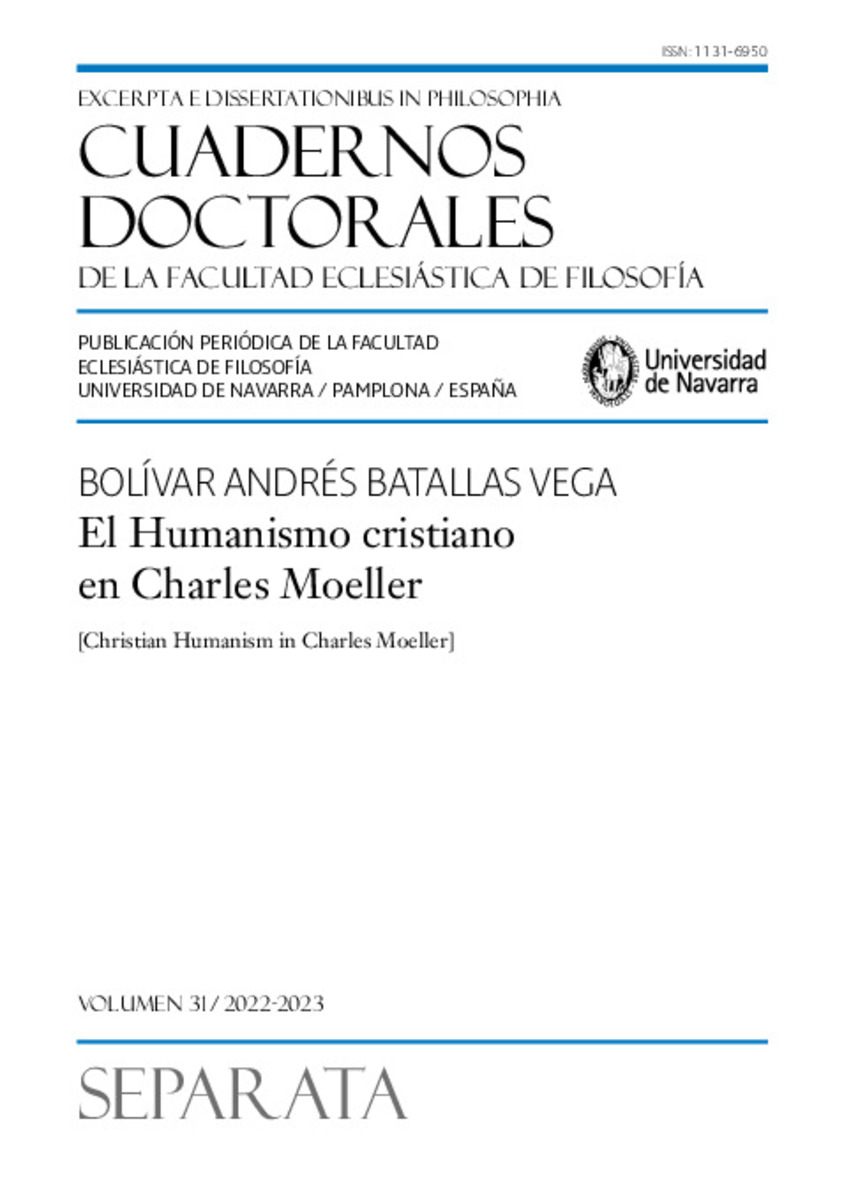Full metadata record
| DC Field | Value | Language |
|---|---|---|
| dc.creator | Batallas-Vega, B.A. (Bolívar Andrés) | - |
| dc.date.accessioned | 2022-12-21T11:06:49Z | - |
| dc.date.available | 2022-12-21T11:06:49Z | - |
| dc.date.issued | 2022 | - |
| dc.identifier.citation | Batallas-Vega, B.A. (Bolívar Andrés). "El Humanismo cristiano en Charles Moeller". Cuadernos Doctorales de Filosofía. Excerpta e dissertationibus in Philosophia. 31, 2022, 209 - 301 | es |
| dc.identifier.issn | 1131-6950 | - |
| dc.identifier.uri | https://hdl.handle.net/10171/64939 | - |
| dc.description.abstract | Esta investigación busca descubrir la propuesta de «humanismo cristiano» en la entera obra de Charles Moeller. Para ello se analiza el hilo conductor filosófico de su pensamiento y se establecen tres «líneas de pensamiento» interrelacionadas que permiten ver que la propuesta de «humanismo cristiano» de Moeller es una respuesta al concepto filosófico de «humanismo ateo» forjado en siglo XIX y radicalizado durante la primera mitad del siglo XX. Moeller reivindica el valor de las realidades humanas cuando el hombre se «abre» a la trascendencia; en tanto que el hombre se deshumaniza cuando se «cierra » a Dios, incluso cuando se invoca el «humanismo » como una valoración de lo humano frente a lo divino. Siguiendo el hilo conductor filosófico de su pensamiento se podría definir el «humanismo cristiano» como el desarrollo pleno y auténtico de los «valores humanos» aquí abajo por la «participación» de estos en los «valores cristianos». | es_ES |
| dc.description.abstract | This research seeks to discover the proposal of «christian humanism» in the entire work of Charles Moeller. For this, the philosophical guiding thread of his thought is analyzed and three interrelated «lines of thought» are established that allow us to see that Moeller’s «christian humanism» proposal is a response to the philosophical concept of «atheist humanism» forged in the 19th century and radicalized during the first half of the 20th century. Moeller claims the value of human realities when man «opens up» to transcendence; while man is dehumanized when he «closes» himself to God, even when «humanism» is invoked as an evaluation of the human against the divine. Following the philosophical guiding thread of his thought, «christian humanism» could be defined as the full and authentic development of «human values» here below through their «participation» in «christian values». | es_ES |
| dc.format.extent | 405 | es_ES |
| dc.language.iso | spa | es_ES |
| dc.publisher | Servicio de Publicaciones de la Universidad de Navarra | es_ES |
| dc.rights | info:eu-repo/semantics/openAccess | es_ES |
| dc.subject | humanismo | es_ES |
| dc.subject | literatura | es_ES |
| dc.subject | valores humanos | es_ES |
| dc.subject | santidad | es_ES |
| dc.subject | ateísmo | es_ES |
| dc.subject | existencialismo | es_ES |
| dc.subject | humanism | es_ES |
| dc.subject | literature | es_ES |
| dc.subject | valores cristianos | es_ES |
| dc.subject | human values | es_ES |
| dc.subject | christian values | es_ES |
| dc.subject | holiness | es_ES |
| dc.subject | atheism | es_ES |
| dc.subject | existencialism | es_ES |
| dc.title | El Humanismo cristiano en Charles Moeller | es_ES |
| dc.type | info:eu-repo/semantics/article | es_ES |
| dc.publisher.place | Pamplona | es_ES |
| dadun.citation.endingPage | 301 | es_ES |
| dadun.citation.publicationName | Cuadernos Doctorales de Filosofía. Excerpta e dissertationibus in Philosophia | es_ES |
| dadun.citation.startingPage | 209 | es_ES |
| dadun.citation.volume | 31 | es_ES |
Files in This Item:
Statistics and impact
Items in Dadun are protected by copyright, with all rights reserved, unless otherwise indicated.






